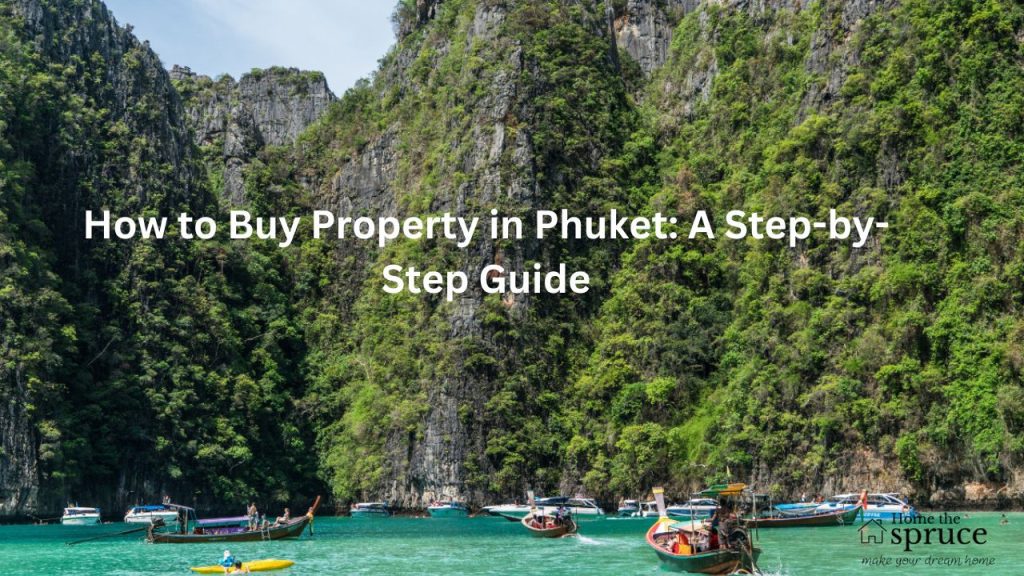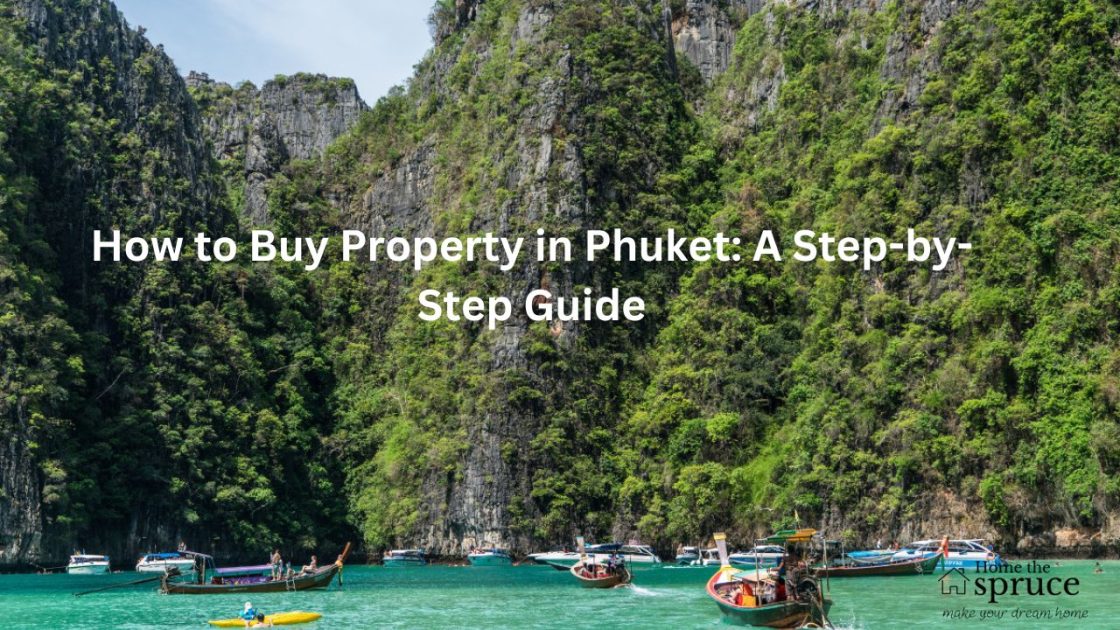Phuket, the jewel of Thailand’s Andaman Sea, is more than just a dream vacation destination. With its stunning beaches, vibrant culture, and excellent infrastructure, it’s also an attractive place for expats, investors, and digital nomads to buy property. Whether you’re looking for a serene retreat, a profitable investment, or a vacation home, Phuket’s property market offers exciting opportunities.
However, Foreigners who want to purchase property in Thailand need to understand specific legal and financial aspects of the process. The guide provides detailed instructions for each step of the property buying process to ensure your confidence in purchasing properties in Phuket.
Why Invest in Phuket Property?

Phuket’s property market has been booming, thanks to its reputation as a top travel destination and increasing demand from international buyers. Here’s why investing in Phuket properties makes sense:
- Strong tourism-driven demand: Over 17.2 million visitors traveled to Phuket in 2024, increasing demand for vacation rentals and property investments.
- Rising land values: Phuket’s land prices have steadily risen, offering a promising outlook for long-term property investments.
- Modern amenities: From luxury beachfront villas to affordable urban condominiums, the range of properties for sale in Phuket suits all budgets and lifestyles.
Whether you’re a seasoned investor, a digital nomad, or planning your retirement, owning property in Phuket can be both rewarding and profitable.
Step 1: Understand Foreign Ownership Laws
Foreigners face certain restrictions when purchasing property in Thailand. It’s important to understand your options:
- Condominiums: Foreigners can legally own up to 49% of apartment and condominium, making this a simple option for property ownership in Thailand. This allows direct ownership of the unit without needing extra legal structures, offering a secure investment.
- Leasehold Agreements: Foreigners can lease land in Thailand for up to 30 years, with the option to renew for another 30 years or more. This provides long-term property use, often for residential purposes. Renewal terms should be clearly outlined in the contract to avoid issues.
- Freehold via Thai LLC: Some foreigners set up a Thai limited liability company (LLC) to buy land, as direct foreign ownership is restricted. This option requires careful legal structuring and compliance with Thai laws. Professional legal advice is essential to avoid complications.
Work with a real estate lawyer experienced in Thai property law to ensure you understand your rights and transactions comply with local regulations.
Step 2: Set Your Budget for Owning Phuket Real Estate
Before you start hunting for properties for sale in Phuket, it’s essential to determine your budget. Don’t forget to factor in additional costs like:
- Stamp duty: Typically 0.5% of the property’s appraised value, this is a government tax paid during property transactions.
- Transfer fees: These are usually around 2% of the property’s value and are required to officially transfer ownership from the seller to the buyer.
- Legal fees and agent commissions: Legal fees cover the cost of hiring a solicitor or conveyancer to handle the paperwork, while agent commissions are paid to real estate agents for facilitating the sale. These can vary depending on the complexity of the transaction.
- Property taxes and maintenance fees: Ongoing costs that include annual property taxes imposed by the local government and maintenance fees for upkeep, especially in managed properties like apartments or condominiums.
Set aside approximately 10% to 15% of the purchase price for these expenses. A clear budget will ensure that you stay financially prepared throughout the process.
Step 3: Research the Phuket’s Property Market
Phuket’s property market varies greatly by location and property type. Different areas cater to different needs:
- Patong Beach: Famous for its nightlife and entertainment, Patong Beach is perfect for live music, nightclubs, and bustling markets. It also offers a variety of restaurants and bars for every taste.
- Kata and Karon Beach: These family-friendly beaches have soft sand and calm waters, great for swimming or relaxing. You’ll also find activities like water sports and plenty of dining options.
- Rawai and Nai Harn: Ideal for retirees or anyone wanting peace and quiet, these tranquil spots feature lush greenery, serene beaches, and a slower pace of life. Perfect for unwinding.
- Thalang District: Known for luxury villas and upscale condos, Thalang District offers premium accommodations close to golf courses and high-end resorts.
- Phuket Old Town: Rich in charm and history, Phuket Old Town is great for investors, with strong rental potential. Its colorful architecture, trendy cafes, and vibrant arts scene add to its appeal.
Additionally, keep an eye on property trends. For example, vacation condos are in high demand among foreign buyers. Areas like Rawai Beach and Bang Tao Beach have seen significant growth in property valuations, offering strong investment returns.
Step 4: Engage a Local Real Estate Agent
Navigating the market can be overwhelming, especially for overseas buyers. Enlisting the help of a trusted local real estate agent provides a strategic advantage. A good agent will:
- Present you with a curated selection of the best Phuket properties for sale, carefully chosen to match your unique preferences, budget, and lifestyle needs.
- Assist in negotiating the best possible price with the seller, ensuring you get the most value for your investment.
- Offer detailed insights into the local property market, including current trends, future growth potential, and an in-depth analysis of neighborhood dynamics to help you make an informed decision.
Local agents often have insights that you might not find through online listings, saving you time and ensuring you get the best deal.
Step 5: Conduct Legal Due Diligence
Before committing to any property, make sure a qualified lawyer conducts thorough due diligence. This includes:
- Checking title deeds to ensure the property is legally owned by the seller and free from disputes, liens, or claims that could affect the transaction.
- Verifying zoning regulations to confirm the property suits its intended use (residential, commercial, or industrial) and complies with local laws.
- Reviewing lease or ownership contracts to identify terms, conditions, or restrictions that may impact the buyer or tenant.
Legal due diligence is vital to protect your investment and ensure a smooth transaction.
Step 6: Visit Properties in Phuket
Seeing properties in person allows you to assess their true value. Schedule visits to inspect important aspects like:
- Construction quality: The durability and craftsmanship used in the building process, ensuring the structure is safe and reliable.
- Neighborhood conditions: The overall environment of the area, including safety, amenities, cleanliness, and proximity to essential services.
- Maintenance standards: The level of care and upkeep for both the property and shared spaces, ensuring everything remains functional and visually appealing over time.
Don’t hesitate to ask questions or request documents for further clarity. A careful inspection ensures no surprises after the purchase.
Step 7: Secure the Property
After agreeing on the price, you’ll typically sign a reservation agreement and pay a deposit (usually around 5% to 10%). This step ensures that the property will no longer be shown to other buyers.
Ensure the agreement includes refund details and contingencies in case issues arise. A trusted lawyer can help review these terms.
Step 8: Finalize Contracts
Work closely with your lawyer to finalize the Sales and Purchase Agreement (SPA). Double-check that it covers:
- Payment timelines: Clear deadlines for when payments should be made to ensure smooth progress.
- Penalties for delays: Specific consequences if payments or deliverables are delayed to maintain accountability.
- Final transfer of ownership: The process and conditions under which ownership will be officially handed over.
This contract formalizes the purchase and sets clear expectations for both parties.
Step 9: Complete the Ownership Transfer
The final procedure requires you to finalize the ownership transfer process at the local Land Office. The lawyer assists with all paperwork documentation along with fee payment and required processes. After completing all necessary steps you will obtain the title deed or lease agreement in your name.
Congratulations! Your Phuket property ownership officially belongs to you.
Tips for a Successful Purchase Phuket Properties

Here are a few tips to ensure a seamless buying experience:
- Choose Established Developers: When buying off-plan properties, stick to trusted developers with a strong track record.
- Plan for Taxes and Maintenance: Stay aware of ongoing costs like property taxes, utility fees, and HOA expenses.
- Diversify Currency Risks: Use reliable currency exchange services to avoid unfavorable rates when transferring funds from abroad.
- Explore Financing Options: While most foreigners buy properties outright, some Thai banks offer limited mortgages.
With careful planning and due diligence, buying property in Phuket can be a rewarding experience.
Your Tropical Dream Awaits
Owning property in Phuket provides access to stunning landscapes, high-quality living, and strong investment returns. By following these steps, you’ll streamline the buying process while minimizing potential pitfalls.








